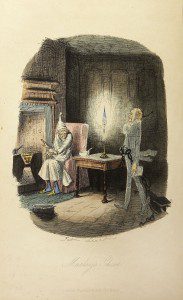Marley’s Ghost by John Leech
I know, I know. The Christmas season is winding down (to be exact, Christmas officially ends January 10 on the Liturgical Calendar), but there is something that has continued to haunt me.
Jacob Marley.
Let me explain.
Every year during Advent, I try to read Charles Dickens’ classic tale, A Christmas Carol. I realize that, for some, the story may seem all too familiar, if not a little tired. After all, countless Scrooges ranging from Seymour Hicks or George C . Scott, from a cartoonish Jim Carey to a Muppet-besieged Michael Caine, annually inundate our television screens as soon as the first snow falls. But I would offer that the vivid London lives of Ebenezer Scrooge, Jacob Marley, Bob Cratchit and the three visiting Ghosts of Christmas Past, Present and Yet to Come can never be dull if you are reading the written yarn as composed from Dickens’ own hand. His writing is sheer genius.
As the familiar story goes, Ebenezer Scrooge is a miserly counting house operator. Harsh to his single employee, annoyed by his one living relative and disdainful of any solicitors for charity, he trudges home to a cold, dark, foreboding home. It is here that the door knocker eerily transforms to the head of his long-dead partner, Jacob Marley. And it is in his locked, darkness-encroached upstairs room that the terror began. Anyone who hasn’t read Dickens’ story has missed out on a fearsome description that rivals Edgar Allen Poe:
[Scrooge] sat down again. As he threw his head back in the chair, his glance happened to rest upon a bell, a disused bell, that hung in the room, and communicated for some purpose now forgotten with a chamber in the highest story of the building. It was with great astonishment, and with a strange, inexplicable dread, that as he looked, he saw this bell begin to swing. It swung so softly in the outset that it scarcely made a sound; but soon it rang out loudly, and so did every bell in the house.
This might have lasted half a minute, or a minute, but it seemed an hour. The bells ceased as they had begun, together. They were succeeded by a clanking noise, deep down below; as if some person were dragging a heavy chain over the casks in the wine merchant’s cellar. Scrooge then remembered to have heard that ghosts in haunted houses were described as dragging chains.
The cellar-door flew open with a booming sound, and then he heard the noise much louder, on the floors below; then coming up the stairs; then coming straight towards his door.
Within moments, a spectre passed through Scrooge’s final defenses. It was indeed his long-deceased partner, Jacob Marley. And their first exchange speaks volumes. With fear masked by insolence, Scrooge addresses Marley’s ghost. “What do you want with me?” Marley simply replies, “Much!” The Ghost then sets up his case. The past mistakes of Marley are the current mistakes of Scrooge. While Marley suffers, Scrooge doesn’t have to… If only Scrooge will listen and change. If only… But Scrooge just doesn’t get it.
“But you were always a good man of business, Jacob,” faltered Scrooge, who now began to apply this to himself.
“Business!” cried the Ghost, wringing its hands again. “Mankind was my business. The common welfare was my business; charity, mercy, forbearance, and benevolence, were, all, my business. The dealings of my trade were but a drop of water in the comprehensive ocean of my business!…Why did I walk through crowds of fellow-beings with my eyes turned down, and never raise them to that blessed Star which led the Wise Men to a poor abode! Were there no poor homes to which its light would have conducted me!”
The dealings of my trade were but a drop of water in the comprehensive ocean of my business.
Wow.
And while Jacob Marley scared Scrooge (and me) into re-considering the eternal consequences of what we value and how we liver our lives, it was the Ghost of Christmas Past who made a stunning point I have missed for years. Shortly after Jacob Marley disappeared, the first of three hauntings would begin. The child-like, illuminated Ghost of Christmas Past appeared at clock’s stroke of One. Before long, Scrooge made his fearful inquiry,
[Scrooge] then made bold to inquire what business brought [the Ghost of Christmas Past] there.
“Your welfare.” said the Ghost.
Scrooge expressed himself much obliged, but could not help thinking that a night of unbroken rest would have been more conducive to that end. The Spirit must have heard him thinking, for it said immediately:
“Your reclamation, then. Take heed.”
Again…Wow. In reading this, I stopped short and considered Dickens’ precise language. Our welfare, yes, is a concern. But, in truth, the story of Ebenezer Scrooge – the story of all of us – is a story of reclamation. We are lost. Sin has blinded us and obscured our path. Our fears, our worries, our appetites, our selfish desires have separated us from the life God wants for us. And while we become comfortable in our sin, deeply and smugly entrenched in our self-centered habits, the message the Ghosts have for Scrooge and, likewise, the message God has for us is quite clear,
It’s not about your comfort.
It’s not about your happiness.
It’s about your repentance and reform.
It’s about your ultimate fulfillment as a Child reconciled with your Heavenly Father.
In sum, it’s about your reclamation.”
It’s about your reclamation. Yes, of course.
This season the Ghost of Jacob Marley and the Ghost of Christmas Past reminded me of this.
How haunting.
How true.
————————————–
Photo Credit: Wikimedia Commons












